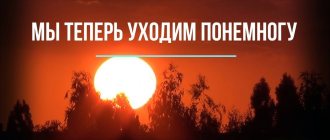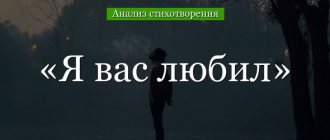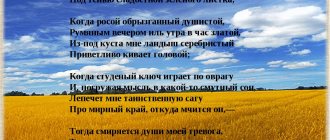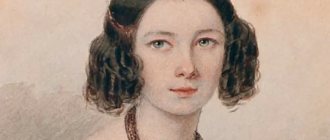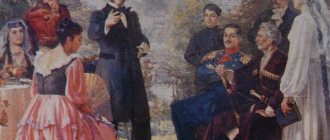The poem “Last Love” by Fyodor Ivanovich Tyutchev belongs to the late period of the poet’s work and is one of his best works. Filled with lyricism and deep drama, it reflects all the experiences Tyutchev experienced in his personal life. We offer a brief analysis of “Last Love” according to a plan that will help you prepare for a literature lesson in 10th grade.
History of creation
The work “Last Love” was written around 1852-1854. Fyodor Ivanovich enjoyed considerable popularity among the fair sex. We know of several “serious” novels by the poet. The first of them is love for Amalia Krudener, love that blossomed in the poet’s soul at a very young age, at 19 years old. Fyodor Ivanovich carried his feeling for this young woman throughout his entire life, but he never connected his fate with her.
In 1826, Fyodor Tyutchev married Eleanor Peterson, a woman whom the author admired, whom he was very grateful, grateful, confident in her, confident in her love. This marriage produced three wonderful daughters.
In 1833, Fyodor Ivanovich began an affair with Ernestina Dernberg, who was married at that time. Eleanor Feodorovna suspected her husband’s betrayal, but behaved with dignity. There was a scandal about this only once, without the presence of Tyutchev himself, after which the poet’s first wife quite quickly passed away. Fyodor Ivanovich was painfully worried about the death of his wife, missed her, turned gray overnight... But a few months later, Fyodor Tyutchev and Ernestina Dernberg got married. This marriage produced two more sons and a daughter.
In 1850, Fyodor Ivanovich Tyutchev met Elena Alexandrovna Deniseva, who studied in the same class with his older children. Ernestina Fedorovna noticed signs of her husband’s attention to her daughter’s friend, but did not attach much importance to them, as she was accustomed to Fyodor Ivanovich’s fleeting novels. But already in 1851, Elena Alexandrovna gave birth to her first child from the poet. Their romance lasted 14 years, until the death of Elena Deniseva.
The poem “Last Love” under analysis belongs to the “Denisevsky cycle”. This cycle can be considered a novel telling about the poet’s “complicated” love for a young girl, telling about “destructive” love, but at the same time about a bright and saving feeling.
The third period of Tyutchev’s work, to which the poem under analysis belongs, is distinguished by tragic, decadent, gloomy notes, and hopeless moods. He is already old, but his muse is young and beautiful.
Analysis of the poem “Last Love” by F. I. Tyutchev
F. I. Tyutchev’s poem “The Last Love” is one of the most outstanding works in terms of purity and sublimity of romantic feeling. It was written in 1852-1854 by an already middle-aged poet and accurately reflects the author’s concept of love - a noble and selfless feeling.
The last love is not as passionate and frantic as in youth. It is based on simple human tenderness, kindness, attention, and caring attitude of people towards each other. At the same time, this is not just friendship, but an experience that is not devoid of romantic overtones. Last
love is doomed to a quick end, so F.I. Tyutchev writes about hopelessness in the final stanza.
But at the same time, this hopelessness is also associated with bliss. This oxymoronic combination, combined into a single melodic image using sound doubling, gives the final chord of the poem a mood of light sadness. The genre of “Last Love” is elegy. The particle “O” gives the work a sublime intonation, as if framing the text of the poem. Rhythmic interruptions also bring a unique artistic effect.
They create a confidential intonation, which, in turn,
enhances the confessional character of the entire work. The central motif of the poem is the motif of light, represented by the following examples: “farewell light”, “evening dawn”, “radiance”). In the second stanza, the opposition “shadow” - “radiance” is conjugated in the oxymoronic phrase “evening day”.
At the problematic and thematic level, this play of light and shadow seems to be in tune with the struggle between life and death. And in this struggle, the last love gives the lyrical hero the strength to resist finitude, to prolong the path of life despite old age and infirmity, to the fact that “the blood in the veins is becoming scarce.”
The lyrical hero hides his feelings.
He is superstitious and takes care of him, because he understands that he will never be able to love again. Love is fragile and tragic, like life itself. It happens that love between people passes by itself. It is often destroyed by quarrels and insults, but at least the person himself is to blame for them.
However, there is one insurmountable circumstance that cannot be prevented - eternal separation, the death of one of the lovers. Thus, love is always both happiness and tragedy. Biographically, the poem is connected with the poet’s love for E. A. Denisyeva and is included in the so-called Denisyevsky cycle.
L. N. Tolstoy, who highly valued F. I. Tyutchev as a poet, about the letters “T.” Ch." .
It is noteworthy that both in theme and mood, the poem “Last Love” echoes the work of P. A. Vyazemsky “January 14 in Vienna”: “My evening star, My last love! On my evening day of joy, shed a ray of joy again!”
But at the same time, this hopelessness is also associated with bliss. This oxymoronic combination, combined into a single melodic image using sound doubling, gives the final chord of the poem a mood of light sadness. The genre of “Last Love” is elegy. The particle “O” gives the work a sublime intonation, as if framing the text of the poem. Rhythmic interruptions also bring a unique artistic effect.
Genre, direction, size
The genre of the work “Last Love” is elegy. The poem is definitely painted in “dramatic” colors; it conveys the poet’s mental torment.
The direction of Fyodor Ivanovich’s work is romanticism. This poem is further proof of this! All attention is drawn to the inner world of the lyrical hero. Feelings in romanticism are more important than reason and reason. Tyutchev’s work is also considered “pure art” - poetry aimed at admiring beauty, enjoying the senses and contemplating nature.
The poem “Last Love” begins with the interjection “o,” which speaks of the emotionality of the work, of the openness of the soul of the lyrical hero, the poet, to the reader.
We do not know what the appearance of the lyrical hero is, but we see his “inner content” - this is the main distinguishing feature of romanticism.
The meter of the poem “Last Love” is iambic tetrameter with pyrrhic. The rhyme is cross-rhyming with alternating male and female rhymes.
Composition
The poem “Last Love” consists of three stanzas. The work can be divided into three semantic parts corresponding to each quatrain.
In the 1st part, the author exclaims, speaking as if on an exhale, after much thought and tossing.
“Oh, how in our declining years we love more tenderly and more superstitiously...”
The poet compares the “last” love with light, with the dawn.
"Shine, shine, farewell light..."
The repetition of words or lines in lyrical works usually focuses the reader’s attention on what is especially important, on the main thing. In this case, the poet used repetition to tell the reader about his joy in seeing this amazing light, about his reluctance to lose sight of it.
The 2nd part is devoted to the life of the lyrical hero, which the poet compares with the sky, which was “covered by a shadow”, with the past day, difficult, tiring, but on the slope so beautiful and illuminated.
The author also resorts to repetition.
“Hold on, linger, evening day, Last, last, charm.”
One gets the feeling that the lyrical hero does not want time to go on, he wants to delay the beautiful moment, “to prolong the charm.”
In the 3rd part, the poet writes that a person’s appearance may change with age, but his heart and soul are always young, full of love and hope!
“Oh you, last love! You are both bliss and hopelessness.”
The last two lines are a desperate conclusion from the poet’s entire reasoning!
Heaven's blessing or torment
Fyodor Ivanovich was already a respectable father of the family, but he still could not resist beauty, and from time to time he was overcome by whirlwinds of passion. Fleeting romances with ladies from high society always worried Ernestine: such hobbies with socialites could ruin her husband’s career.
The meeting that changed fate
A girl from an impoverished noble family, thanks to the merits of her aunt, studied at the Smolny Institute. Elena Denisyeva was even considered a candidate for the role of maid of honor of the imperial court. And this seemed like a very real prospect for many reasons:
- The thoughtful and serious girl had a natural mind and received a good education.
- The elegant and graceful brunette was very charming. Her brown eyes and expressive face attracted the attention of both young men and older socialites.
- All the listed advantages were complemented by manners - impeccable, perfectly mastered by the young Smolenskaya girl.
At first, the girl even visited the Tyutchevs’ house as a friend of their daughters. She saw that aristocratic coldness and restraint reigned in this family; everyone seemed to have their own separate life. Participation in joint tea parties, readings in the living room, trips to balls and the theater happened regularly, but these very intelligent people still seemed to close themselves off from everyone in their own experiences, as if in a protective cocoon.
The mistress of the house did not just love her husband. Ernestina adored him, and her eyes tried to catch every glance, and the warm word already made the woman happy.
And when the couple met a friend of Tyutchev’s daughters from his first marriage, the wife was not very worried. She believed that Theodore would soon become bored with the young and naive young lady. But fate decreed otherwise, and the plan collapsed.
Having become fascinated by Lelya, the forty-seven-year-old poet was unexpectedly shocked when he realized that the girl responded to his feelings so passionately and selflessly. Chamberlain Tyutchev was so captivated by the young Smolensk woman that he even found and rented an apartment for meetings with the beauty.
The secret was soon revealed, giving rise to a huge scandal. The young lady turned out to be pregnant, and this was on the eve of her graduation! There could be no talk of any court appointments. The light turned away from her, and her own father cursed her.
Life for two families
Denisieva found consolation in prayers and God. Everything turned out to be very difficult, but there was an aunt nearby, several friends and He, the beloved and only one (for Lelya this was the main thing). The whole meaning of existence for Elena was now in Tyutchev, and the beauty was ready not only today, but all her life to wait and love him. Two months later they had a girl.
The poet found himself in a difficult situation: two women found themselves in his destiny at the same time. He called one his beloved, his happiness, he could not live without her. And he understood perfectly well that he was not able to respond with the same force to Elena’s feelings. But she was able to forgive - and did forgive:
- his long wait during the frequent absences of the chamberlain;
- rare (once a week) lunches together;
- selfishness and hot temper, and then even sometimes coldness;
- existence for two families.
On the second side of the scale was his other life: a devoted wife, daughters - ladies-in-waiting at court, a career as a chamberlain diplomat. Tyutchev could not refuse all this, and did not want to.
Elena was sure that before the Lord they were one in spirit and body, which means she was a real wife, even more than his two official ones. Denisyeva makes a decision for herself: such a marriage is God’s permission. The poet managed to convince her that, according to church rules, he no longer has the right to get married, and creating a joint family is impossible.
However, being semi-married, giving birth to three children to your loved one, and still being a pariah for people of your class is difficult. Moreover, almost fifteen years. At times, the kind and highly cultured Elena, unable to restrain herself, broke down, and the further, the more frequent were the manifestations of her desperate protest against the existing situation. Tyutchev understands that her reproaches are fair, but there has been a cooling in the relationship.
And again consumption. This is the second time that a disease that doctors cannot cope with takes away the poet’s wife. This time a civilian one. Then Elena's daughter and son die.
And only then does Tyutchev fully realize what this woman meant to him. He remains a prisoner of her all-consuming love and understands that there is an emptiness in his soul. And it can no longer be filled. The poet will not be able to come to terms with the loss, and memories of it will haunt his soul until his death.
Images and symbols
The lyrical hero of the analyzed work “Last Love” is the poet himself, since the work is addressed to the author’s beloved and reflects real events. The lyrical hero is a person who has already seen a lot, experienced everything that was possible... But suddenly he discovers something new for himself! This is new - well forgotten old, this is love! And again seeing this “light”, feeling, feeling this “fragile”, the lyrical hero approaches love in a new way, with great trepidation, with great respect, with gratitude, immersed in this feeling completely, without leaving himself for anything else !
The main focus of the work is precisely this feeling – love! The author compares it with light. Light is a symbol of truth, light is something necessary, integral, conquering darkness. Love is exactly the same, all-consuming, all-pervasive and necessary. She opens her eyes to the “real” world, to the world as it was intended.
Further, the poet directly compares the last love with the dawn.
“Shine, shine, farewell light of the last love, the dawn of evening!”
The dawn is a symbol of the coming of Christ. That is, there will be no more darkness, there is unquenchable light! The poet replaced sunset with the phrase evening dawn, which explains the lyrical hero’s attitude towards the feeling that overcomes him; the lyrical hero perceives it as something growing, increasing and intensifying.
Further the poet writes:
“Half the sky is covered in shadow, Only there, in the west, does the radiance wander…”
Most likely, here the author did not veil anything, but figuratively described the events taking place, presenting his life as a sky, in which there was no place for joy, but suddenly light appeared, giving the joy of life to the lyrical hero.
It is also very interesting that one of the symbolic meanings of the West is middle age, that is, exactly the age at which the poet arrived at the time of writing the work. This fact once again proves that the lyrical hero is a self-portrait of the poet.
What follows is a very beautiful oxymoron “evening day”, which again describes the author’s attitude to what is happening, to the sudden joy in life.
Briefly
When Tyutchev was an adult man and a famous author of many works, he fell in love with a girl who was a pupil of a boarding house for noble maidens.
The poet did not think that he was capable of loving someone for so long. Elena reciprocated the poet’s feelings, and their romance lasted very stormy. A large number of different gossips and disputes arose in high society, but Tyutchev was happy, and his work “Last Love” tells us about this. Tyutchev tries to understand his own feelings and emotions, and then Fr. The man was married twice, but never experienced the emotions and feelings that were born in his heart in his relationship with Elena. He compares it to the dawn that illuminated his path. In this love, the man sees the meaning of his own life, and also thanks to it, inspiration awoke in him, which, it would seem, had already left the poet.
The important thing is that after meeting the girl, the poet again notices how beautiful nature is and turns to landscape lyrics. Outside the window is what most suits his feelings and thoughts at the moment. He does not want the day to end, and at the same time he does not want his own life to end just as inexorably. But the warmth that the author’s last love gives him warms his soul and fills him with a huge number of different feelings.
Topics, problems, mood
The main theme of the poem “Last Love” is enshrined in the title - this is love. Fyodor Ivanovich's love lyrics are distinguished by amazing sensitivity, emotionality, and openness.
The “Denisevsky cycle” is special, which is dedicated precisely to the poet’s last love. This collection is filled not only with passionate love and sensuality, but it is also one of the most disturbing and desperate.
This is the problematic of the work, in the interweaving of love, tenderness and despair, a strange feeling of one’s own inadequacy to the circumstances, anxiety, fear. Old age contrasts with youth, the sunset of days collides with the bright light of dawn.
The mood of the poem “Last Love” cannot be called alarming, although similar notes are inherent in it. The work is filled with hope and gratitude, joy and “tender” fear, which dissolves in the wisdom of the lyrical hero.
main idea
The main idea of the poem “Last Love” is a response to the problems of the work. The poet decides to love, although he does not write this directly.
“Oh you, last love! You are both bliss and hopelessness.”
The last lines describe the mixed feelings of the lyrical hero. One gets the impression that he decides to “dive headlong” into love, although he is not entirely confident in himself and doubts.
The meaning of Tyutchev’s poem “The Last Love” is that love is light, and you cannot hide from it, love supports us, lifts us up and protects us, love is breathing, and it is impossible to live without breathing. That is why the lyrical hero makes such a decision; he is a fairly experienced, wise person who has experienced a lot.
Subject
Each line of the poem is permeated with a strong and tender feeling. However, these are not the passionate and frantic love experiences of youth, but much deeper and heartfelt emotions of maturity.
The basis of the love of an elderly person is tenderness, kindness, attention, the desire to care for and protect his beloved. But, nevertheless, this is not a friendly relationship devoid of romanticism, but the genuine love of a man for a woman.
The lyrical hero understands that this gift from heaven - the last love - is doomed one way or another, and melancholy and hopelessness are evident in the work. He superstitiously protects it, since such a strong mutual feeling will never happen again.
Means of expression
The analysis of Tyutchev's poem "Farewell Love" should be completed by listing the tropes. Artistic means expressively create the unique style of the author and express his feelings.
- Epithets: “farewell light”, “last love”, “last love”.
- Metaphor: “in one’s declining years”, “evening dawn”, “blood becomes scarce”, “tenderness does not become scarce”.
- Personification: “a radiance roams,” “a shadow has engulfed half the sky.”
- Oxymoron: "evening day."
- Lexical repetition: “shine, shine...”, “slow, slow...”, “last, last...”.
- The inversion can be seen throughout the poem. For example, “we love more tenderly and more superstitiously...”.
- Rhetorical exclamation:
“Shine, shine, farewell light of the last love, the dawn of evening!” “Oh you, last love!”
Author: Kristina Asaulova
Analysis of Tyutchev’s poem “Last Love”
Already a mature man, an accomplished diplomat and a famous poet, Fyodor Tyutchev fell in love with the young pupil of the boarding house for noble maidens, Elena Denisyeva. The author did not even suspect that in his declining years he was capable of experiencing such strong feelings. Moreover, he was amazed that his love was reciprocated. The romance between Tyutchev and Denisyeva developed rapidly, becoming the subject of numerous disputes and gossip in high society. However, the poet could not fully believe his own happiness, as evidenced by the poem “Last Love”
Trying to understand his feelings, Tyutchev comes to the conclusion that “in our declining years we love more tenderly and more superstitiously.” This man, wise from life experience, who was married twice and managed to raise children, discovers completely new character traits in himself that he did not even suspect. The poet compares his unexpected love with the evening dawn, which illuminates his path with a special radiance. It is in this all-consuming feeling that the author sees not only the meaning of his earthly existence, but also draws strength for inspiration, which, according to Tyutchev, has long since left him.
Already a mature man, an accomplished diplomat and a famous poet, Fyodor Tyutchev fell in love with the young pupil of the boarding house for noble maidens, Elena Denisyeva. The author did not even suspect that in his declining years he was capable of experiencing such strong feelings. Moreover, he was amazed that his love was reciprocated. The romance between Tyutchev and Denisyeva developed rapidly, becoming the subject of numerous disputes and gossip in high society. However, the poet could not fully believe his own happiness, as evidenced by the poem “Last Love”
Means of expression
Sublime intonation is achieved through the use of the particle “o”, with which the author skillfully frames the work. Lexical repetitions add lyricism and amazing musicality to the poem.
(“last, last,” “slow, slow”).
The expressiveness and imagery of the work is achieved thanks to numerous epithets
(“last”, “evening”, “farewell”) and metaphors
(“half of the sky is covered in shadow”, “a radiance is wandering”).
The lyrics of Fyodor Tyutchev do not leave any reader indifferent. Many poetic works are devoted to the theme of love, about which the famous Russian poet knew a lot. He knew how to love without reserve, dissolving in feelings to the very depths.
Despite his romantic nature, the poet did not perceive the word “treason”; he simply did not consider it regrettable to love several women at the same time. An interesting fact about Tyutchev’s personal life - he lived in two families, and gave all his tender feelings and frankness to each lover.
The most unpredictable events took place in his life; each meeting left certain thoughts in the poet’s memory, which he skillfully conveyed in his brilliant work. The verse “I met you, and all the past...”, known to many readers, was written after a meeting with a woman who later became his lover.
In general, it should be noted that the person in Tyutchev’s poetry - be it “cosmic” or love - is weak and majestic at the same time. Fragile as a reed in the face of nature, he is great with some kind of inner, inexplicable strength. A similar duality is felt in this poem, only here this duality is expressed through parallelism (comparing natural phenomena with human life), more characteristic of folk poetry. In this work, the hero’s last love is associated with the evening dawn:
